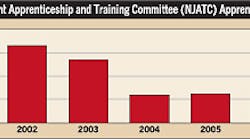Electrical contracting firms are on the hunt for the next generation of electrical workers due to the looming retirement of Baby Boomers. Valley Electrical Consolidated, Inc., located in Girard, Ohio, is a good example. It employs about 25 to 30 electrical apprentices, who make up about 10% of its workforce. While it's an expense for an electrical contractor to bring an apprentice on board, it's worth the investment, says Rex Ferry, president and CEO of Valley Electrical. “If you have vision as a leader, you need to spend your dollars now,” says Ferry, the president-elect of the Bethesda, Md.-based National Electrical Contractors Association (NECA). “They're the future of our industry, and you need to train them.”
About 95,000 skilled workers will hang up their tool belts in the next decade. As these Baby Boomer tradesmen retire, a new wave of electrical apprentices will enter the workforce. In the next 10 years, the electrical industry will need 22,400 new workers each year, according to the Construction Labor Research Council's January 2007 report. “All the skilled trades are facing a shortage, and it's a difficult situation,” says Bob Baird, national vice president of apprenticeship and training for the Independent Electrical Contractors (IEC), Alexandria, Va. “We have to be diligent about making people aware of opportunities, because there are more opportunities now than ever before.”
The skilled labor shortage has fueled the demand for qualified apprentices. An estimated 225,000 persons are enrolled in federally registered, multi-year, apprentice programs. The IEC has grown the number of apprentices from 2,000 to 10,000 from 1995 to 2007, and the number goes up and down, depending upon demand. Although the National Joint Apprenticeship and Training Committee (NJATC) has an enrollment level more than three times that size, it has experienced a steady decline in the number of apprentices in its program from more than 38,000 in 2002 to about 34,000 last year (Fig. 1) due to a struggling telecommunications industry and the 9-11 terrorist attacks. Breaking this number down into inside and outside apprentices, however, reveals a slight increase in the number of individuals training to become outside linemen (Fig. 2 and Fig. 3).
To attract more young men and women to the electrical trade, the IEC is recruiting at the national, chapter, and individual contractor level, reaching out to state governments and educators and becoming active in organizations like Skills USA. The NJATC is making high school students and counselors aware of opportunities in the electrical industry through a DVD, podcasts, and a My Space page. To make the electrical industry even more lucrative to high school students, the NJATC is partnering with the American Council on Education to assign up to 60 college credit hours to apprentices during their apprenticeship. In addition, many JATC programs have established relationships with local colleges to help apprentices earn their associate degrees following the completion of their programs.
With the average age of an electrician sitting at 47, the doors are wide open for electrical apprentices, Baird says.“If someone has an interest in the trades and some basic skills, the ability to work with his or her hands, the willingness to show up on time, and a desire to learn, there's a place for them in the industry,” he says.
Following are profiles of 10 up-and-coming electricians. These summaries offer a snapshot of the electrical industry's faces of the future.
Apprentice: Charles Venter
Age: 23
Company: KPS Electric, Aurora, Colo.
Chapter: Rocky Mountain Chapter IEC (Denver)
Watching electricians wire his parent's basement inspired Venter to pursue a career as an electrician. He completed a two-year course for basic electrical training at a technical college, and once he graduated from high school, he joined KPS Electric and enrolled in a four-year Rocky Mountain Chapter IEC apprenticeship program.
Venter recently won the IEC's 15th annual Apprentice of the Year competition, which places the top graduates from apprenticeship programs nationwide in a head-to-head competition. Venter and the other contestants are an excellent representation of the future of the electrical industry, says John Quebe, KenMor Electric, Houston, and 2007 IEC national president.“They are bright, motivated, and hard-working, and IEC is proud to have helped them obtain a skill set that will provide them with numerous opportunities throughout their careers,” he says.
Venter, who recently graduated from the apprenticeship program, is planning on pursuing teaching, contracting, engineering, and inspecting during his career.“The electrical field is a great trade, and it is only getting better,” he says. “With the way the world is expanding and the new advancements in technology, it's hard to say what the future will hold, but I'm sure it will be exciting.”
Apprentice: Grant Haughn
Age: 28
Company: Alliance Service and Control Specialist, Phoenix
Chapter: IEC of Arizona (Phoenix)
Today's electricians are dramatically different compared to a decade ago, Haughn says. Electrical apprentices now work on advanced lighting controls, low-voltage communications wiring, and energy management systems. Although this type of work used to only be done on high-end projects, it's now a part of electrical apprentices' routine work, he says.
To stay current on codes, trends, and technology, Haughn took classes on the topics of OSHA rules, lockout/tagout requirements, CPR and First Aid, project management, and estimating. He also had intensive Code training during his four-year electrical apprenticeship program. Following in the footsteps of his twin brother, who enrolled in the apprenticeship program in California, Haughn says becoming an electrician is one of the best decisions he has ever made. In the next five years, he plans to be in upper management. In 10 years, he sees himself as the owner of an electrical contracting company.
Apprentice: Jeremy Netting
Age: 28
Company: MJB Electric, Columbus, Ohio
Chapter: AEC-IEC (Columbus, Ohio)
Netting has always been a tradesman, but not in the electrical field. He started his vo-tech training in the auto-diesel field, and when the economy declined, he entered the electrical field. Recently graduating from the four-year apprenticeship program and attaining a fire alarm installation license, he plans to continue his education in low-voltage and voice/data. In the future, he would like to obtain his NICET certification, which would allow him to engineer and approve fire alarm blueprints. Netting also hopes to one day co-own an independent electrical contracting business. “I value my experiences in the field, but I would like to build on them to take a part in the managerial positions in the electrical trade,” he says.
Apprentice: Jerimy Stevens
Age: 31
Company: J&K Electric, St. Petersburg, Fla.
Chapter: IEC Florida West Coast, Clearwater, Fla.
Stevens, a former Air Force aircraft electrician, always makes it a point to learn about the new Code changes and technologies to give him a competitive edge. He completed his four-year apprenticeship program with the IEC and the aircraft electrical and environment systems maintenance program with the Air Force. Because he feels like he can help with the future training of electricians, he would like to teach others one day.
Although he's not planning on running his own company anytime soon, Stevens says he plans to stay in electrical contracting as a career. “No matter how the world changes, the world will need electricity,” he says. “Computers will change, cars will change, buildings will change, but they will need to be powered. The job to install and fix electrical supply wiring will always be there.”
Apprentice: Ron Whaley
Age: 36
Company: Giles Electric Co., Inc., South Daytona, Fla.
Local: Daytona Beach Electrical JATC Local Union 756
Whaley became an electrician after searching for a new career. During his five years in the electrical industry, he has worked on a new wastewater plant, the renovation of the Daytona Super Speedway, a high-tech Cath-Lab hospital addition, and two new schools.
“I am constantly learning, in school, on the job, even just listening in conversations that the journeymen wiremen have,” says Whaley, a fourth-year apprentice who is currently working in electrical service.
Right now, he says his career goals are wide open. Within the next five to 10 years, he hopes to become a master electrician.
“I want to become a good example to future apprentices on what the union electrician is all about,” he says.
Apprentice: Dick Johnston
Age: 23
Company: Electrical Tech. Services, Inc., Daytona, Fla.
Local: IBEW Local Union No. 756, Port Orange, Fla.
Johnston's father, a 27-year union electrician, inspired him to follow in his footsteps. He started his apprenticeship with the basic principles of electricity, and then moved on to study controls. Now in his fourth year, he plans to graduate in August 2008 and return to school to finish his business degree and begin work on obtaining a degree in engineering. “It may be a tough road for some, but it's not so tough when you enjoy what you do,” he says.
Apprentice: Daniel Shewmaker
Age: 21
Company: Bodine Electric, Decatur, Ill.
Local: IBEW Local Union No. 146, Decatur, Ill.
As a third-year apprentice, Shewmaker says he has an edge when it comes to learning about new technology in the field. During his electrical apprenticeship program, he has learned about cable splicing, the use of calibration tools, safety, and the NEC. He estimates that about 90% of his training has been through on-the-job training, but he has also learned skills in the classroom.
Right now, he prefers to work in the field with his hands rather than pursue a career in engineering or management. In the future, he expects the work to be more complex than it is now as well as based more on electrical theory and solar applications.
Apprentice: Brian James Shaw
Age: 30
Company: Free State Electric, Beltsville, Md.
Local: IBEW Local Union No. 26 JATC, Lanham, Md.
Shaw began his career in the communications field but later moved into the electrical trade because he found it more interesting. Through the NJATC, he learned First Aid skills and practical work skills. Upon graduation, the third-year apprentice plans to eventually move into contracting and open up his own company. “I would encourage people to learn more about the field because it does look promising,” he says.
Apprentice: James Poole
Age: 26
Company: K. T. Electric, Gaithersburg, Md.
Local: IBEW Local Union No. 26, Lanham, Md.
A fascination of how electricity works drew Poole to the electrical field. Deciding to join the apprenticeship program to get a better opportunity and a chance to broaden his knowledge base of the trade, he's now in his third year. Down the road, he plans to become a foreman or owner of a company. “I've always had a passion for numbers and figuring things out,” says Poole.
Apprentice: Rateeluck “Tarn” Puvapiromquan
Age: 27
Company: Children's Hospital/Varco Mac, Lanham, Md.
Local: IBEW Local Union No. 26 JATC, Lanham, Md.
Electrical contractors are pushing for faster output and a larger skill set from electrical apprentices, says Puvapiromquan. This apprentice is taking night classes and working until she graduates from her apprenticeship program. Puvapiromquan is interested in remodeling, and would like to eventually own her own remodeling and demolition business. “As long as my body is able, I would like to work in the field possibly organizing or teaching,” she says.
Sidebar: Skill Set of Tomorrow
Rex Ferry, CEO of Valley Electrical Consolidated, Inc., in Girard, Ohio, began his career as an electrical apprentice, spent 16 years in the field, and grew his business from a $4.5 million operation in 1990 to a $40 million firm today. He advises other young electricians who want to own their own electrical contracting businesses to work hard, be aggressive, show up on time, and be willing to take on new challenges. Here are some other qualities firms are looking for in the new wave of apprentices.
-
Well-rounded, skilled craftsmen with a good work ethic, knowledge of the electrical industry, and the ability to coordinate with other trades to ensure a smooth, productive job.
-
The ability to work in a fast-paced environment, deal well with change, and adapt to new installation methods and technologies.
-
Team players who are dependable, responsible, and independent thinkers.
Sidebar: The Next Generation
How do new apprentices differ from those entering the industry 10, 20, or 30 years ago? The new wave of electrical workers reflects the next generation of Americans, says Michael Callanan, executive director of the National Joint Apprenticeship and Training Committee, Upper Marlboro, Md., who notes that the apprentices are more diverse, ambitious, and educated than ever before. The applicants are still predominantly male, but more females are starting to apply for the apprenticeships. In addition, the NJATC had the greatest number of minority entrants in 2006.
Because high schools tend to steer students away from the trades and toward a college education, IEC and the NJATC are also attracting older electrical apprentices. The average age of an electrical apprentice today is 28, according to the U.S. Bureau of Labor Statistics. Many of these individuals have college degrees, and because of this higher education, the typical applicant tends to have greater math, reading, and analytical skills than the electricians of the past, according to the NJATC.
While today's electrical apprentices tend to be older and more diverse, their basic skill set isn't much different than it was 20 years ago, says Bob Baird, national vice president of apprenticeship and training for the Independent Electrical Contractors (IEC), Alexandria, Va. They still need to read blueprints and install panels, cables, controls, and boxes in a workmanship-like manner. Although the main scope of their job hasn't changed, the devices they install have become more complicated. Apprentices today must know how to install and troubleshoot all types of solid-state devices, such as remote dimmers in homes or lighting control systems in high-rise buildings, Baird says.
The electrical industry is changing at a rapid pace, and over the past decade, nearly every aspect of the trade has seen development and implementation of new technologies, work methods, and installation practices, Callanan says. To keep pace with technology, apprentices and journeymen alike must continuously upgrade their skill set and have a broad-based understanding of electrical theory and applications.
“Ten or 20 years ago, a new journeyman left his apprenticeship with a set of skills that had a shelf life of 10 years or more,” Callanan says. “Today, our new journeymen are lucky to get by with their skill set beyond two years. New electrical workers must commit to life-long learning, and must be able to adapt their skills and understanding of the electrical trade to the new demands and challenges of the industry.”
Sidebar: A Glimpse into the Future
Many electrical apprentices enter the electrical field because they know qualified electricians will always be in demand. When they look ahead to the future of the industry, they forecast growth in the following three areas.
Alternative energy — Electrical apprentices are currently working on solar, wind, and geothermal energy projects. One day soon, Bob Baird, national vice president of apprenticeship and training, Independent Electrical Contractors, Alexandria, Va., predicts they'll be working on charging stations for electric cars.
Computer technology — Electricians are increasingly moving into fields traditionally belonging to other trades, such as LON and LAN networks and computer programming, says Michael Callanan, executive director of the National Joint Apprenticeship and Training Committee (NJATC), Upper Marlboro, Md. Both now and in the future, computer skills will be core to the job of an electrician, says Rex Ferry, president and CEO of Valley Electrical, Girard, Ohio, which equips its foremen and superintendents with laptops, digital cameras, and cell phones.
Controls — While controls are not a new aspect of the electrical industry, they have become more important as energy costs continue to rise and more advancements have been made in computers and small electronics, says Dick Johnston, an apprentice for Electrical Tech. Services, Inc., Daytona, Fla.



